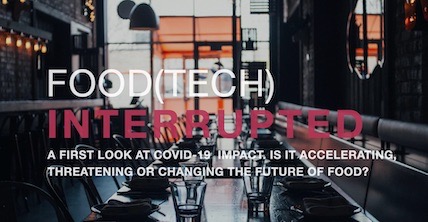Hi,
The great reopening is nearing. What will reopen, how and when exactly, we don’t know yet. Just being able to think the next step, out of lockdown, offers (it works for me at least) solace.
If I am not a big fan of all the collapsologists or “the world will never be the same” opinions, it is indeed true that this crisis will have consequences on many parts of our lives and economies, notably in food. I do prefer thinking about it as an entrepreneur and looking for opportunities. I have read this interview of Big Mamma’s co-founder, Tigrane Seydoux which sums it pretty well: “as an entrepreneur, we have to look toward the future and reinvent ourselves, it is now or never”.
We can’t tell what the world will look like with certainty (my crystal ball remains foggy). We can however be sure that COVID-19 and its short-term consequences will accelerate and reorient some trends we were already observing. Here are two examples:
- Short term: E-grocery startups are booming, from Uber-like players such as Instacart or Supermercato24 to completely new online supermarkets as LaBelleVie or Mathem
- Long term: robotic delivery. While two months ago, robots and drones were only used in lockdown environments such as universities, they are now finally free to circulate in our streets (isn’t it ironic?). What was bad (no human contacts, robots in the streets, etc.) is now good. This crisis is the shift of robotic startups and their corporate partners were waiting for. They will now have live data and feedback to grow.
We have applied these lenses on news coming from startups in the past month and summed them in our “Food(Tech) interrupted” report. It is free to download. It may help you as individuals or companies (startups or large F&B corporates and retailers) to start conversations on how to transform yourself to be ready for a new world of opportunities.
Have a great week,
Matthieu
Find out more on our COVID-19+FoodTech report
#1 – Restaurant delivery startups slash their fees (willingly or not)
As often, things can get complicated when talking about meal delivery startups. They have the (hopefully unwanted) ability to generate controversy in almost in any context. It should not be different in a crisis as COVID-19. More than the security of its delivery workers (which have its fair share of controversy), the most debated topic is… the commission these apps take on restaurants.
As most chains (such as McDonald’s or Burger King) have removed their restaurants, there has been a drop in the deliveries, which have been almost compensated by orders to small restaurants (already operating on delivery platforms before the crisis or newcomers). Therefore, the idea is that delivery startups are somewhat making money on the back of strained restaurants. Then comes the question of the delivery fees, notably in the US where they have been more or less willingly slashed.
#2 – Foodservice startups in trouble
Many foodservice startups whose clients are individual restaurants or chains are in trouble. Indeed, even those working on a subscription business model are facing unwillingness to pay unused services and the fear that many of their clients will not reopen their doors. These startups are adjusting by cutting their staff as we are shifting from a “growth at all cost” to a “profitability above all” paradigm.
#3 – Is it finally the right time for meal kits?
Do you remember the time when most (including us) were judging the future of meal kits as complicated, to say the least, due to high acquisition costs and low retention? Things have apparently changed as they are now among the most coveted startups.
#4 – Alcohol delivery booms – can it last?
Unsurprisingly, COVID-19 lockdown has created a surge in alcohol consumption. Even if alcohol has been considered “essential” in many countries, enabling dedicated shops to remain open while other businesses (such as bookshops, which is somewhat disturbing when thinking about the future of humanity), needs are apparently not met. Indeed, as any online retailers have a restricted offering, consumers have turned to dedicated startups to raise the level of their spirit.
Bookclub: here are two book recommendations particularly fitted for this lock-up period:
- AntiFragile by Nassim Taleb. He is the guy behind the “black swan” book and concept. In AntiFragile, he explains how to build companies and projects that can resist to extraordinary events.
- Should we eat meat? By Vaclav Smil (Bill Gates famously wrote “There is no author whose books I look forward to more than Vaclav Smil”). This is a passioning history of human meat consumption, why and how we should meat.
As you can see, FoodTech is indeed moving faster than ever in 2020. But you are not alone. DigitalFoodLab is here to help you :
- Stay at the top of your domain. We prove exclusive insights and information through talks and our FoodTech watch
- Prepare for the future. We help you make plans for long term trends and their implication on your business and to identify the right startup to work on your current issues.
- Innovate faster. We work with you to define the innovation strategy fitted to your business means and needs.
No matter if you are a startup or a food giant, we are here to work with you and change the world of food! (contact us).








